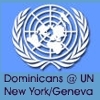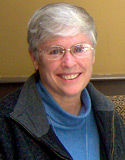

| BRIEFING - April 18, 2012 | To learn more about the Millenium Development Goals, click on the graphic Past Briefings: April 4, 2012 March 7, 2012 February 22, 2012 February 8, 2012 January 25, 2012 January 11, 2012 December 21, 2011 December 7, 2011 November 9, 2011 October 19, 2011 October 5, 2011 September 21, 2011 September 7, 2011 |
|
Happiness and wellbeing: Defining a new economic paradigm By Mary Virginia Leach, OP
The Government of Bhutan’s presentation to a jam-packed UN conference hall (with an overflow crowd nearly filling a second large auditorium!) advocated a new way of determining a nation’s fullest development and sustainability. Bhutan and other credible speakers called for a paradigm shift in determining “wellbeing”—speaking convincingly about what indicators should be used to measure sustainable development. Not surprising in this shift, far less focus is placed on indicators related to consumerism and profit margins. Domains offered as authentic outcomes of wellbeing included:
The Prime Minister of Bhutan, Mr. Jigmi Y. Thinley, remarked on the mission and purpose of the meeting sharing information about his nation’s efforts to re-define, re-assess, and move towards true “development” in the context of sustainability, “in harmony with the natural world” and “to break away from the tenacious grip of consumerism.” Subsequent speakers included Mr. Ban Ki-moon, secretary general of the United Nations; Mr. Nassir Abdulaziz Al-Nasser, president of the UN General Assembly; and Mr. Milos Koterec, president of the Economic and Social Council (ECOSOC). Each praised the “noble and ambitious goal” of Bhutan and their efforts to build a new, creative guiding vision for sustainability. Such efforts contribute greatly to achieving the United Nations’ Millennium Development Goals of 2015. Then the keynote speaker, Ms. Laura Chinchilla, president of the Republic of Costa Rica, addressed the assembly. Costa Rica is universally recognized for its outstanding achievements in environmental conservation and its exemplary sustainable development record, a nation ranked as the greenest in the world, having met all five criteria for environmental sustainability. Ms. Chinchilla provided a history of her country’s choices for bettering their citizen’s lives based on democracy, solidarity, a focus on education, and improving the quality of the lives of Costa Ricans. Military spending decreased significantly in 1948 when Costa Rica abolished their army and strengthened their goal of nourishing the economic, social, cultural, and spiritual quests of their people. She challenged the UN to work together on two key issues: determining the best course to initiate holistic development and determining the best accountability or performance evaluation to measure that development. Speakers from many countries then spoke about efforts taken in their nations in support of achieving a more comprehensive sustainable development plan. A few such contributors were from:
Worldwide leaders of sustainability next led four vibrant panels of impressive speakers on related topics. From the USA, Professor Jeffrey Sachs, director of the Earth Institute at Columbia University, and Dr. Jonathan Patz, Nobel laureate and professor and director of the Global Health Institute at the University of Wisconsin, led panels on the topics of “Wellbeing and Happiness” and “Ecological Sustainability.” Other panel discussions included: “Efficient Use of Resources” and “Fair Distribution.” Question-and-answer sessions followed. To say that the entire day was inspiring, innovative, and hope-filled is an understatement! To this participant, it was an example of the United Nations at its best! May good things flow from the ideology presented, documented, and promoted at this vibrant session.
|
Dominican Leadership Conference
Building relationships and collaborating in the mission of preaching the Gospel
29000 West Eleven Mile Road
Farmington Hills MI 48336
248-536-3234 Contact: Executive Director
 Among the many interesting UN sessions I’ve experienced as a visitor to our Dominican NGO office this month, one I found particularly intriguing was the panel discussion on “Happiness and Wellbeing” organized by the Permanent Mission of Bhutan. First, a few questions to help contextualize the content of this discussion:
Among the many interesting UN sessions I’ve experienced as a visitor to our Dominican NGO office this month, one I found particularly intriguing was the panel discussion on “Happiness and Wellbeing” organized by the Permanent Mission of Bhutan. First, a few questions to help contextualize the content of this discussion: